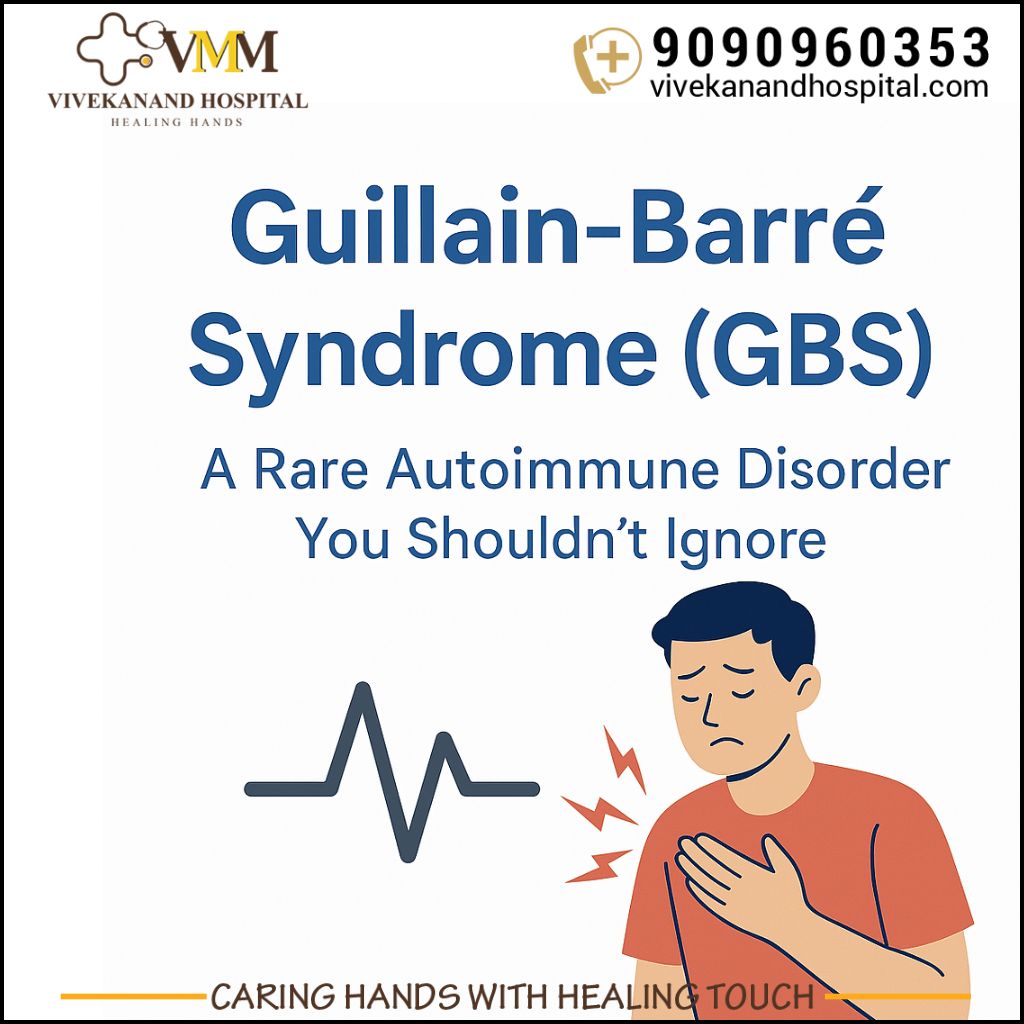Introduction:
Guillain-Barré Syndrome (GBS) is a rare but serious autoimmune condition where the immune system mistakenly attacks the peripheral nerves. Often triggered by infections, this disorder can lead to muscle weakness, numbness, and even temporary paralysis. With early diagnosis and prompt treatment, most patients can recover. Vivekanand Hospital, Bhubaneswar, offers advanced diagnostic and neuro-rehabilitation support for GBS patients across Odisha.
What is Guillain-Barré Syndrome (GBS)?
GBS is an autoimmune neurological disorder in which the body’s immune system targets its own nerves, specifically the peripheral nervous system. This can result in sudden muscle weakness, tingling sensations, and in severe cases, paralysis. It is considered a medical emergency requiring immediate attention.
Causes and Risk Factors of GBS:
– Infections: GBS often follows a respiratory or gastrointestinal infection. Campylobacter jejuni is a common bacterium linked with GBS.
– Vaccinations or Surgery: Rarely, vaccines or recent surgeries might act as triggers.
– Other Illnesses: Viral infections like Zika virus, COVID-19, and Epstein-Barr virus have been associated with GBS.
Early Symptoms of Guillain-Barré Syndrome:
– Tingling or pins-and-needles sensation in feet or hands
– Muscle weakness, starting in the legs and moving upwards
– Difficulty walking or climbing stairs
– Rapid heart rate or abnormal blood pressure
– Difficulty breathing in severe cases
Types of GBS:
1. Acute Inflammatory Demyelinating Polyneuropathy (AIDP) – The most common form.
2. Miller Fisher Syndrome (MFS) – Starts with eye muscle weakness and loss of reflexes.
3. Acute Motor Axonal Neuropathy (AMAN) and Acute Motor-Sensory Axonal Neuropathy (AMSAN) – Affect motor and sensory nerves.
Diagnosis of GBS:
At Vivekanand Hospital, neurologists perform various diagnostic tests:
– Lumbar Puncture (Spinal Tap) – Increased protein levels in cerebrospinal fluid
– Nerve Conduction Studies – Measures electrical signals in nerves
– MRI Scan – To rule out other conditions
Treatment for Guillain-Barré Syndrome:
There is no cure for GBS, but treatments help speed up recovery and reduce symptoms:
1. Intravenous Immunoglobulin (IVIG)
Provides healthy antibodies to block the immune attack.
2. Plasmapheresis (Plasma Exchange)
Removes harmful antibodies from the blood.
3. Supportive Care & Rehabilitation
Patients may need ventilatory support, physical therapy, and long-term rehabilitation to regain mobility and strength.
Read Also: Ketoconazole in Shampoo: Uses, Benefits & Side Effects | Vivekanand Hospital Bhubaneswar
Recovery and Prognosis:
Most patients recover within weeks to months, although fatigue, muscle pain, or minor nerve issues may persist. Around 80% of patients walk independently within six months of treatment.
Why Choose Vivekanand Hospital, Bhubaneswar for GBS Care?
– 24×7 Emergency & Neuro ICU Services
– Experienced Neurology Team
– Advanced Neuro-Diagnostic Facilities
– Post-Hospitalization Rehabilitation Support
– Compassionate, Patient-Centric Care
Conclusion:
Guillain-Barré Syndrome may be rare, but it can be life-threatening if left untreated. Early detection and specialized care significantly improve outcomes. If you or a loved one experience any GBS symptoms, don’t wait. Visit Vivekanand Hospital, Bhubaneswar for expert guidance, treatment, and hope.

